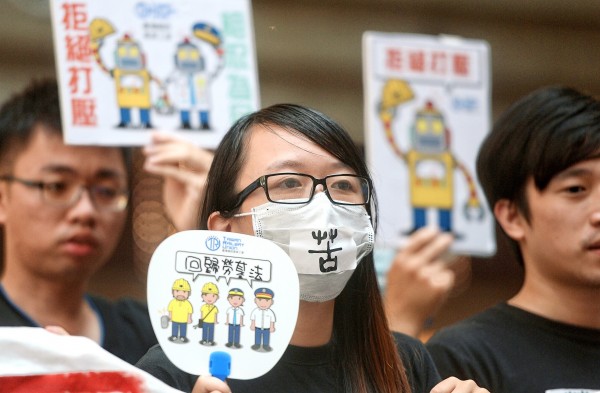《TAIPEI TIMES 焦點》 TRA collective bargaining pact outdated, union says

Members of the Taiwan Railways Administration union hold up signs during a protest march from the Taipei Railway Station to the Executive Yuan in Taipei yesterday. Photo: Lin Cheng-kun, Taipei Times
DOUBLE WHAMMY: Railway employees are subject to two separate work regulations that the railway agency abuses to their detriment, union director Chou Kai said
By Abraham Gerber / Staff reporter
The collective bargaining agreement for Taiwan Railways Administration (TRA) employees is outdated and exploitative, Taiwan Railway Union members said yesterday in a protest outside the Executive Yuan.
“Oppose exploitation, we want rest. Comrades, let us fight to the end for tomorrow’s victory,” the demonstrators chanted, turning heads as they marched from Taipei Railway Station’s central hall to the Executive Yuan, where they posted a copy of their three-day work schedule on one of the gates.
About 25 union members had camped out at the station overnight to protest the failure of the TRA to take clear steps to improve working conditions, which they said have worsened since the last collective bargaining agreement was signed in 1988.
According to the agreement, workers do not take regular days off, instead working alternating day and night shifts with a 24-hour rest period in between, a cycle that repeats every three days.
“While this was the way shifts were arranged in the past, because of a staff shortage, we can no longer take a holiday,” union director Chou Kai (周鍇) said.
Chou said that the number of employees has fallen steadily, while the work load has increased due to the TRA’s efforts to turn the railways into a subway-like commuting system, adding new stations and routes along the western and northern lines.
“As every train should have at least one locomotive engineer and one car captain, there should in theory be at least one or more car captains for every engineer, but there are more engineers than car captains,” he said, adding that the lack of “reserve workers” was the main reason workers are not allowed to take holidays.
Union members also accused the TRA of arbitrarily applying the Labor Standards Act (勞動基準法) and the Civil Service Act (公務人員服務法) regulations.
Railway workers are subject to both acts, as they are employed by the government and have to pass civil service exams.
“Legally, the TRA is supposed to choose whichever of the two standards is most favorable to us, but that has not played out in reality,” Chou said.
“For example, the Civil Service Act is used on the issue of job responsibility, because penalties for violations are higher, but for rest time regulations, we are treated as workers,” he said.
Railway workers’ classification as “civil servants” also allows the government to require them to work on national holidays, he said.
“Regarding the issue of Teachers’ Day, the TRA should apply the Labor Standards Act to allow us to take a day off like everyone else, but instead we have been forbidden from doing so on grounds that we are ‘civil servants,’” union president Wang Jieh (王傑) said.
The Ministry of Labor has said that workers would be able to take the Sept. 28 holiday off this year, following the Legislative Yuan’s failure to pass regulations that would lead to the elimination of the holiday and several other holidays for workers as part of a five-day workweek policy.
新聞來源:TAIPEI TIMES
















